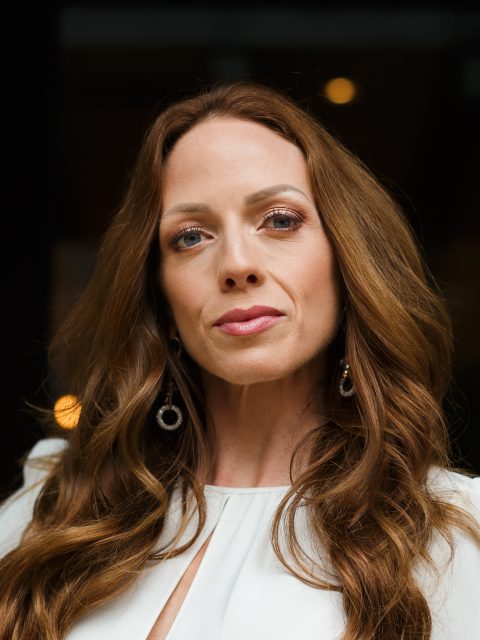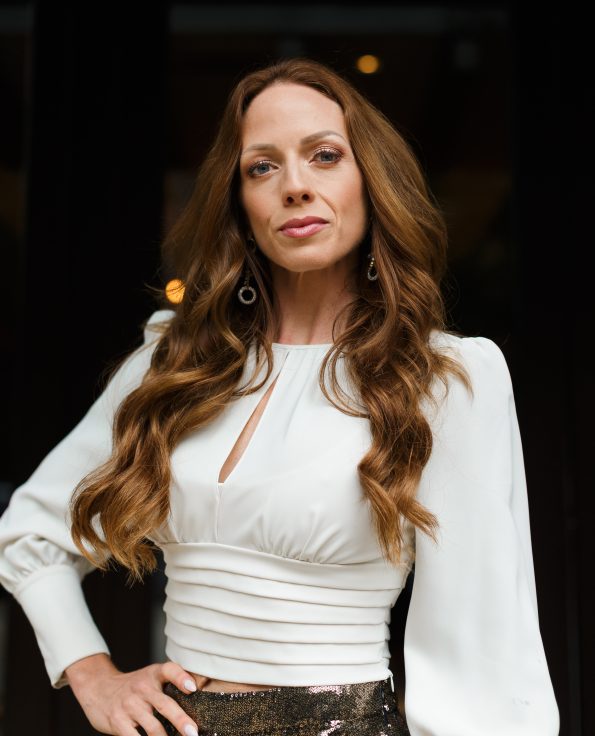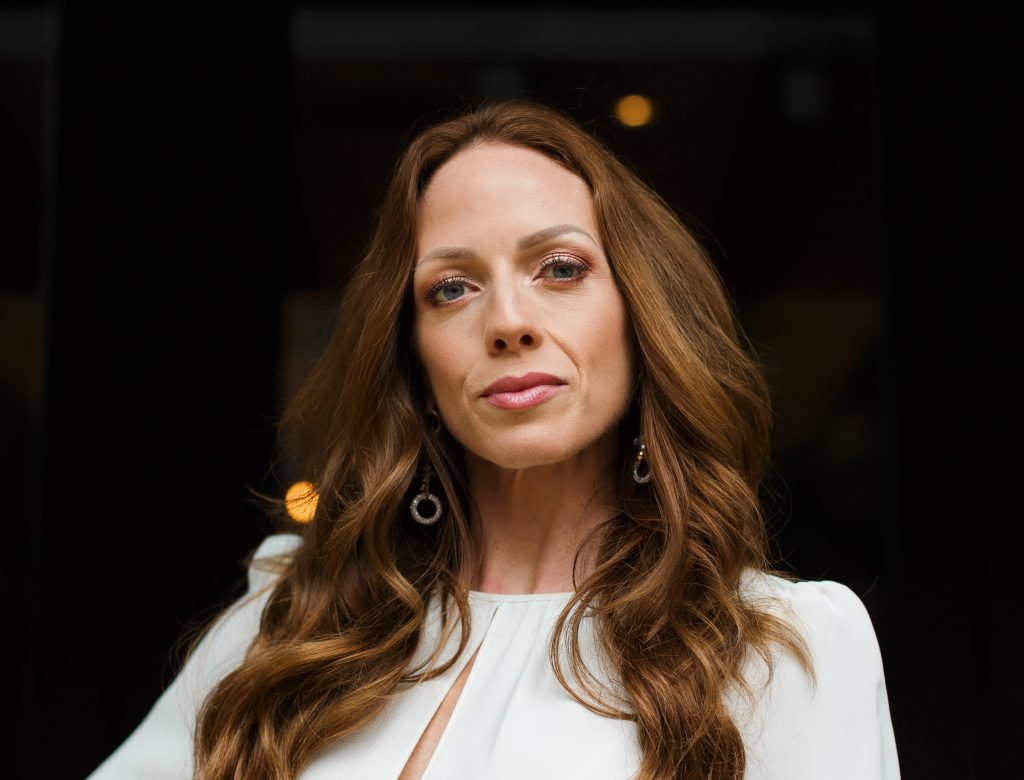
As part of our Female Founder series, The Startup Magazine caught up with Amy Wilhelmi. Amy is a successful multi-entrepreneur as the founder of Balance Wellness Collective and Ascension Mentality, business & performance coach at Strategic Voyages Business Consultants, and licensed mental health therapist. As a speaker, author, and athlete, she is on a mission to become a global go-to thought leader in making mental health for athletes normalized, approachable, and accessible. As an athlete herself, she “gets” the mental health struggles, challenges, mentality, and grit it takes to perform at such a high level.
Ms. Wilhelmi is also the author of her book “Making Mental Gains.” This book is for individuals who feel stuck in their lives, personally and/or professionally. There are no hacks or gimmicks here. In her brazen, get-it-done style, Amy shows you how to move forward out of apathy through your everyday lifestyle habits, mindset, and belief system.
Her second book, called “Ascension Mentality,” comes out later this year and tells the story of her own journey through being a high performer, challenges throughout her life, and how she persevered through those challenges to be the person she is today. For more background information about Amy Wilhelmi, visit www.amywilhelmi.com.
By sharing her personal story of being a licensed therapist, performance coach, athlete mindset and mentality coach, and bikini bodybuilder, as well as sharing stories of others, Amy hopes that she can change the outlook for athletes so they have better mindsets, performance outcomes, and don’t feel like they’re struggling alone. Here she has shared more about her journey.
TSM: Can you tell us, in 10 words or less, what is the central message of your work in mental health and wellness for athletes?
Amy: I help athletes with mental fortitude, wellness, performance anxiety, perseverance in difficult states, and change.
TSM: With a bit more detail, what inspired you to work on mental health in athletics and how do you work with clients? Can you talk about your experience in bodybuilding as an example?
Amy: I am a competitive bodybuilder myself. And immediately after getting into this sport as an athlete, I saw a gap in mental health resources for athletes. Under most circumstances, athletes who struggle with their mental health would be easily labeled by common mental health professionals as “disordered.” The general public and most trained mental health professionals do not understand the mindset of top athletes and what it takes mentally to perform at such high levels. My work began because there was a glaring need for someone to help that was both an athlete themselves and an educated, trained, licensed mental health professional.
Many athletes turn to their coaches when they’re struggling mentally, and then many coaches don’t know where to turn when the athletes’ problems are more than their training or capacity. That’s where I come in. I have a foot on both sides of the line. It’s my passion and my life’s work rolled into one. The “how” is individualized to each team or athlete themselves. But some main components are strategic planning and setting goals both short-term and long-term, check ins, accountability.
I ask the following questions:
- Where are they at mentally?
- What are they struggling with?
- Where do they want to be?
- How do we get there together?
TSM: Many athletes—Olympic gymnast Simone Biles, tennis star Naomi Osaka and Olympic swimmer Michael Phelps—had their struggles publicized as they walked away from competition or turned to other ways to cope with the next phases of their lives. Can you describe what they might be feeling or going through?
Amy: Overload. Burnout. Not enough rest. Not taking time to deal with whatever personal issues they have going on with the expectation to perform. We forget that these top athletes are human sometimes. They don’t look human; they look like superheroes. To most people, top athletes are there to do one thing: perform well. Most people don’t see the stress that comes with that lifestyle. Sure, athletes have nutritionists, trainers, rehab specialists, coaches to keep them on track, but what happens when they are traveling all the time and away from their family? What happens to their mental health when they have no days off? What happens when just LIFE happens to them like it does to everyone, yet they still are expected to perform? And what happens when their peak performance season runs out? What are they left with then? Who do they turn to for help? It is not their trusted coaches, trainers, and peers—they have to focus on the athletes who are still IN the game.
Being a professional athlete and suddenly not being one is similar to veterans returning from the war. No one knows what it is like except the people who were there. They athlete are left with very few resources, have to rearrange their entire purpose/ way of living their lives, and form a new identities. I work with athletes IN their sport to keep them IN their sport, but I also work with them to transition OUT of their sport and find fulfillment and happiness in their next steps.
TSM: As a licensed mental health therapist, what kind of services can you provide to an athlete who has questions about their goals, direction and purpose, career pivots and finding a sense of self?
Amy: It isn’t about services per se because everyone is an individual and has different goals for working with me. But my specialty besides mentality is the PIVOT. I also work in the realm of entrepreneurship and business consulting, and many of the plans we tend to dream up have an entrepreneurial flair to them. I don’t just want my athletes working post retirement, although continuing to find revenue streams and live financially stable is healthy. I want my athletes to dream big, so they can find passion, motivation, and even create joy in their next steps. My end goal is for my athletes to be on a path that doesn’t feel like they’ve given up the dream. The thought is that their dream (their athletic career) has shifted into something equally as life giving (or, dare I say, MORE). I always encourage them to aim for more.
TSM: How might your advice you’d give an athlete struggling to work toward their goals apply to an entrepreneur in the middle of launching a startup company?
Amy: See above  They’re a very similar mindset. It’s common knowledge that it takes approximately three years for a startup to leave the “startup phase” and start to function like an actual business with revenue generating profit. When I’m working with athletes, I spend much of my time helping them refocus not on the growing pains of today (missed opportunities, performance minutia of a bad game, etc.), but on the broader picture that I like to call “The Gestalt. It’s a German word used in the art world that means “the way things are put together to form the whole picture.” This definition also lives in my world as a Licensed Marriage and Family Therapist and Business Consulting. I see things in systems—the bigger picture. You are just one piece of a very large puzzle.
They’re a very similar mindset. It’s common knowledge that it takes approximately three years for a startup to leave the “startup phase” and start to function like an actual business with revenue generating profit. When I’m working with athletes, I spend much of my time helping them refocus not on the growing pains of today (missed opportunities, performance minutia of a bad game, etc.), but on the broader picture that I like to call “The Gestalt. It’s a German word used in the art world that means “the way things are put together to form the whole picture.” This definition also lives in my world as a Licensed Marriage and Family Therapist and Business Consulting. I see things in systems—the bigger picture. You are just one piece of a very large puzzle.
When I am able to train athletes to think this way in whatever crisis they’re dealing with at the moment (because athletes tend to think in micro moments–one move to the next), we’re able to step back and see the WHOLE. The tiny crisis seems more manageable and, dare I say, a NEEDED piece of that puzzle. They need to experience that pain point to get to a different perspective or the next move that will further elevate them to where they want to go. We are playing the LONG GAME. Startups don’t turn into Amazon overnight. You don’t go from unknown rookie to Michael Jordan overnight. It takes time, patience, hard work, discipline, consistency no matter what your God-given talents are.
TSM: For a problem that affects athletes and entrepreneurs alike, what do you say to people who are ready to throw in the towel and give up on their goals?
Amy: Your goals are not big enough then. They don’t scare you enough. Or there’s something off about them that’s not lighting your soul on fire. People that have high hard goals that they feel passionate about don’t give up on them. Life happens and time and attention we can give to things change depending on the seasons of life, but those goals that you are super connected to sit in your psyche and call you over and over and over.
Those are the goals you should be going after and ignoring the other ones taking up your energy. So, my biggest advice is to figure out what lights you up. Follow that. Move everything else around to make room for that. Then, apply consistency, discipline, and hard work. Some people call this selfish. I call this self-love.
TSM: You’ve dedicated most of your professional life to helping nurture and empower people. Going back to your early career decisions, tell us what factors influenced your decision to focus on mental health management?
Amy: I had a tough childhood. I was the child of an alcoholic who had mental health issues (addiction and mental health go hand in hand) so, in a way, mental health has always been something on my radar. When I got old enough, I figured out that something that gave me life was helping and serving others. My career was born out of the passion to help and to deal with my own coping skills. It took me some time to unwind my own childhood with the help from many years of professional therapy and following my passions. And, although my own resources were kind of haphazard at best, I also found solace in pursuing my education.
My secondary education was something that I was solely responsible for getting; I graduated with an undergraduate and a Master’s degree. Figuring out that I was intelligent, driven, and able to carve my own path in life after being handed not super awesome circumstances in my youth drove me further into my mission of helping others. If I can change my life, you can too.
TSM: On the business side of providing mental health services, what have been the primary challenges in your own entrepreneurial journey? Marketing? Billing and Finance?
Amy: My biggest challenge was the accounting of it. I knew the structure of how to work in private practice. I knew the ins and outs of the business of running it. I needed help on the accounting side—the business of managing money. The structure of how, how to build it, how to get clients, how to get a physical building, how to incorporate it, how to hire people to work in it—those things didn’t scare me. I pretty much knew the formula. I thought, “Ok, I’m doing well and making money, but how I manage the balance sheet so that all of this hard work does not topple.” So, I hired someone to help me pretty early on in my practice.
TSM: With all of your experience helping goal-setters and as an entrepreneur yourself, what is the most important advice you can offer other startup founders?
Amy: It has never been about the money, unlike many people who start businesses. It has always been about my heart, passion, desires, and a decision to build something that represents my values and does something good for the world. I would recommend that people do a values system inventory that is very lengthy and complete. And then, at the end of that, if the business that you want to build fits into your core value system, then run with that.
It would be hard to wake up every day (especially when the business is new) and grind away for very little money or accolades. When you’re an entrepreneur, you’re really alone on your island. No one cares about your business as much as you do, and does something they don’t believe in doing. It’s almost impossible. If you are driven by fire and passion, even those “bad days” aren’t that bad because it’s your soul’s work.
TSM: Tell us something about yourself that most people don’t know?
Amy: Besides being there for many humans professionally, I am a Mom and have a blended family of five kids and a Great Dane. So, besides building my empire, working with my athletes that I love, and doing bodybuilding shows, I’m pretty much just “Mom.” And, in my free time, I really love spending time with my family. I can put away the cape for the day.
TSM: Absolutely. Thanks for sharing your insights and good luck with your future successes.

The post Female Founder Interview: Amy Wilhelmi, Entrepreneur, Author, and Athlete appeared first on The Startup Magazine.






![Read more about the article [Tech50] This startup aims to help companies launch products in a short span with pre-made systems](https://blog.digitalsevaa.com/wp-content/uploads/2021/12/Sanket-1638513018303-300x150.jpg)



